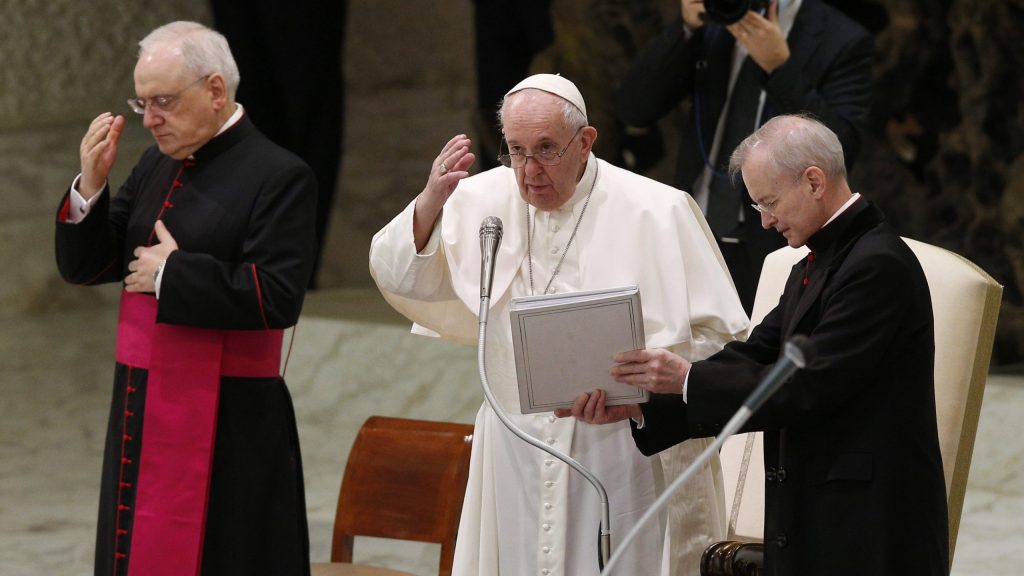Pope Francis said Wednesday that Christians should pray from the heart and not “like parrots.”
In his general audience address in the Paul VI Audience Hall Oct. 21, he said: “The worst service someone can give God, and others as well, is to pray tiredly, by rote. To pray like parrots. No, one prays with the heart. Prayer is the center of life.”
He made the comments during a reflection on the Psalms, the 11th in a cycle of catechesis dedicated to prayer that he began in May. The pope paused the cycle in June for a series of reflections on the coronavirus crisis, before resuming it in October.
Today’s audience was still marked by the pandemic. Pilgrims sat wearing face coverings in the audience hall, amid rows of empty seats, and the pope remained at a distance from them throughout.
“I apologize for this,” he said at the start of the audience, “but it is for your safety. Instead of coming near you and shaking your hands and greeting you, we have to greet each other from a distance, but know that I am near you with my heart. I hope that you understand why I am doing this.”
The pope said that during the biblical reading at the start of the audience, he noticed that one of the pilgrims was comforting a crying baby.
“I was watching the mamma who was cuddling and nursing the baby and I said: this is what God does with us, like that mamma. With what tenderness she was trying to comfort and nurse the baby,” he said, adding that babies should always be allowed to cry in church.
In his catechesis, the pope observed that the Psalms present prayer as “the fundamental reality of life.” He said that a prayerful relationship with God prevents human beings “from venturing into life in a predatory and voracious manner.”
“Prayer is the salvation of the human being,” he said.
But he noted that there is also a “false” form of prayer that seeks only to impress others.
“The person or those persons who go to Mass only to make it seen that they are Catholics or to show off the latest fashion that they acquired, or to make a good impression in society. They are moving toward false prayer,” he said.
“Jesus strongly admonished against such prayer. But when the true spirit of prayer is sincerely received and enters the heart, it then allows us to contemplate reality with God’s very eyes.”
He emphasized that how we pray and how we treat others are deeply connected.
“Those who adore God, love His children. Those who respect God, respect human beings,” he said.
“And so, prayer is not a sedative to alleviate life’s anxieties; or, in any case, this type of prayer is certainly not Christian. Rather, prayer makes each of us responsible.”
The pope suggested that if we want to learn to pray this way, the Psalms are a “tremendous school.” While they are often “intimate and personal,” the prayers were first used in the Temple in Jerusalem and later in synagogues.
He quoted the Catechism of the Catholic Church, which says that “The Psalter’s many forms of prayer take shape both in the liturgy of the Temple and in the human heart.”
“And thus, personal prayer draws from and is nourished first by the prayer of the people of Israel, then by the prayer of the Church,” he explained.
He said: “Even the Psalms in the first person singular, which confide the most intimate thoughts and problems of an individual, are a collective patrimony, to the point of being prayed by everyone and for everyone.”
“The prayer of the Christian has this ‘breath,’ this spiritual ‘tension’ holding the temple and the world together. Prayer can begin in the penumbra of a church’s nave, but come to an end on the city streets. And vice versa, it can blossom during the day’s activities and reach its fulfillment in the liturgy. The church doors are not barriers, but permeable ‘membranes,’ willing to allow everyone’s groans in.”
The pope warned pilgrims that those who do not pray from the heart can begin to treat others with contempt.
“If you pray many rosaries each day but then gossip about others, and nourish grudges inside, if you hate others, this is truly artificial, it is not true,” he said.
He continued: “Scripture acknowledges the case of the person who, even though he or she sincerely searches for God, never succeeds to encounter Him; but it also affirms that the tears of the poor can never be repudiated on pain of not encountering God.”
“God does not support the ‘atheism’ of those who repudiate the divine image that is imprinted in every human being. That everyday atheism: I believe in God but I keep my distance from others and I allow myself to hate others. This is practical atheism.”
“Not to recognize the human person as the image of God is a sacrilege, an abomination, the worst offense that can be directed toward the temple and the altar.”
He concluded: “Dear brothers and sisters, the prayers of the Psalms help us not to fall into the temptation of the ‘wicked,’ that is, of living, and perhaps also of praying, as if God does not exist, and as if the poor do not exist.”
In his greeting to Polish-speaking pilgrims, Pope Francis noted that Oct. 22 is the feast day of St. John Paul II, who served as pope from 1978 to 2005.
He said: “He, a man of deep spirituality, every day contemplated the luminous Face of God in liturgical prayer and in meditation on the Psalms. He also exhorted all Christians to begin their days with praise to the Lord, before embarking on the not always easy ways of daily life.”

